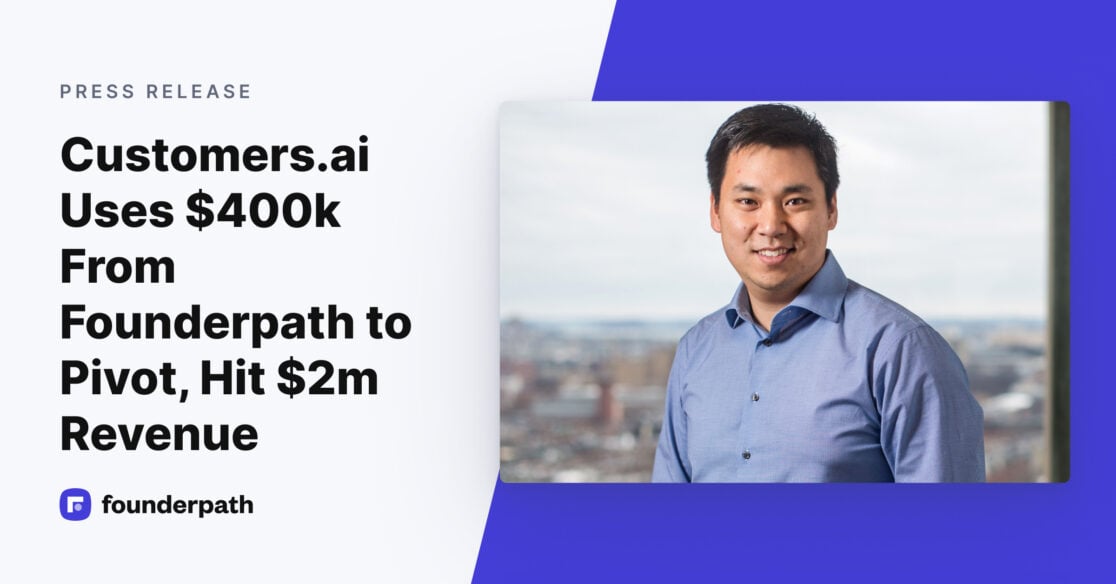How Larry Kim Used Founderpath to Pivot Customers.ai and Hit $2M+ Revenue

From a $200M exit to a near-death startup — how one founder used non-dilutive capital to fuel a pivot instead of giving up equity.
Background: From WordStream to MobileMonkey
Larry Kim isn’t new to big wins.
He sold WordStream to Gannett for $200M in 2018 after building one of the leading PPC and Facebook ad management tools in the world.
A year later, he launched MobileMonkey, a fast-growing Facebook Messenger automation platform that hit $1M ARR in under a year. But then, the business flatlined.
When Facebook changed its policies for Messenger automation, MobileMonkey’s revenue stalled, SMB customers churned during the pandemic, and Larry was suddenly down to a few hundred thousand dollars left in the bank.
The Dilemma: Down Round or Dilution-Free Capital
Despite being independently wealthy, Larry didn’t want to write himself a blank check.
“I could have put in my own money,” he said. “But you really want a neutral third party to price the round — otherwise, you end up punishing yourself or your early investors.”
At that point, traditional venture debt wasn’t appealing either:
“I’d done the bank route before — Square One, venture debt, warrants, board approvals — months of paperwork. It’s almost as painful as a full equity round.”
So instead, Larry turned to Founderpath’s Revenue Financing.
The Solution: Fast, Fair, and Non-Dilutive
Larry connected his Stripe and QuickBooks accounts directly to the Founderpath platform. Within five business days, he had a $400K non-dilutive credit line in his account.
“It’s like getting scored instantly. No long meetings, no flying around the country to pitch VCs. Founderpath gave me a dispassionate, data-driven view of my business and wired the money in a week.”
He matched the Founderpath funds with an equal personal investment, giving Customers.ai nearly a full year of runway to build their new product.
The Pivot: From MobileMonkey to Customers.ai
With runway secured, Larry rebranded MobileMonkey to Customers.ai and built a proprietary language learning model (LLM) trained on millions of behavioral data points from its legacy install base.
That early data — hundreds of thousands of browser fingerprints, plugins, and session patterns — became the foundation for Customers.ai’s identity graph, which can now reveal the email of anonymous website visitors.
The pivot worked.
- Grew from $1M to $2M+ ARR
- Hundreds of paying customers
- Multiple enterprise contracts >$100K/year
- Over 40 employees
- Burn/ARR ratio below 1.0x
The Outcome: Series A at 10x Higher Valuation
Within a year, Customers.ai had the traction and product-market fit needed to raise a Series A — this time, on strong terms and at a much higher valuation.
“That $400K Founderpath loan probably created tens of millions in enterprise value,” Larry said.
“If I’d raised equity while flatlining, I’d have given up 20–30% of the company. Instead, I paid a few tens of thousands in interest — and kept my cap table clean.”
When he raised his Series A, Larry paid off the Founderpath loan early — “two emails and a wire transfer,” as he put it — and now runs a fast-growing SaaS platform with mid- to high-single-digit millions in ARR.
Why Larry Recommends Founderpath
✅ Speed: “Five days from start to finish.”
✅ Simplicity: “Connect your data, get a score, and funds hit your account.”
✅ Non-Dilutive: “No term sheets, no down rounds, no warrants.”
✅ Alignment: “Gave me the runway to prove my pivot and raise later at 10x the valuation.”
Final Takeaway
Larry’s story shows why non-dilutive capital is often the smarter path — even for founders who could fund themselves.
He preserved ownership, rebuilt his product, and scaled from near-failure to $2M+ ARR — all without giving up a single share.
Recent Articles
Bootstrapping a Startup: The Complete Guide for SaaS Founders
Only about 0.05% of startups ever raise venture capital, according to Fundera. The other 99.95% either bootstrap, borrow, or shut…
SaaS Financial Model: How to Build One That Investors Want to See
A SaaS financial model is the single most important document in your company — and most founders get it wrong.…
SaaS Startups: How to Start and Fund a SaaS Company
Global SaaS spending is projected to approach $300 billion in 2025, according to Gartner, growing at nearly 20% per year.…